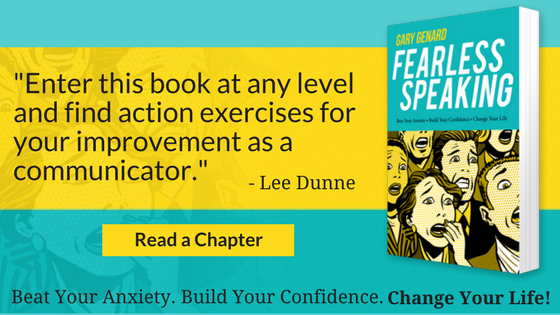
Want to empower your public speaking while removing fear and speech anxiety? Use this actor's trick to develop a strong stage persona and presence!
If you have fear of public speaking, you might wish for a foolproof level of confidence when you're on stage, like, say, an actor. But would you believe actors have just as much stage fright as anyone else?
As an actor, I can testify to that. Of course, it depends upon the individual. Some actors don't have any stage fright; while for others, that's simply not true. It's the same effect you'll find in the general population.
We all benefit from being in "The Zone" when we speak. Who doesn't want to be present and hitting on all cylinders? But how can you ensure that you'll perform like that every time? For help in becoming a powerful speaker even if you have just 5 minutes to prepare, download my essential sheet sheet, "How to Calm Your Nerves Before Speaking."
On the other hand, there's a crucial difference between public speakers who have speech anxiety, and actors. The latter are much more likely to know about specific techniques to reduce stage fright. How could it be otherwise? No stage actor would survive giving eight performances a week to a thousand people or more without a way to turn off the fear factor.
Developing a Public Speaking Persona
But what about this intriguing possibility: Shouldn't we as speakers also be able to use a stage persona as an aid to overcome speaking fear?
Indeed, we can. And that's why I sometimes offer this advice to my clients with overwhelming speech fright: develop a performance persona of themselves to get them through the crucible of fear that public speaking represents for them. I call it a "speaking version" of themselves.
If you suffer from fear of public speaking, you're not alone. Professionals all over the world struggle every day with a debilitating level of anxiety over speaking in public. What are the causes of speaking fear, and how can you overcome them? To answer both questions, and to learn to speak with confidence and power, see my article on the 10 Causes of Speech Anxiety that Create Fear of Public Speaking.
I got the idea of a speaking persona from some advice a client had read about, advice that I thought was half-right. The article my client had read, on overcoming speaking fear, mentioned a visualization technique of "wearing a mask" when you go on stage. The idea is that you'll be safe behind that imagined mask. After all, this isn't really "you" out there—it's just the version of you giving this speech or presentation. You yourself aren't at risk!

Use Your Persona Until You No Longer Need It
You might say I half-liked that idea; and I used it to come up with the tool of the speaking persona I mention above. The reason I liked it is because of its interventional quality.
If you're an emergency room doctor faced with a patient who has overdosed, your immediate and overriding task is to save that person's life. The education and support necessary to put him or her on a path to a healthier life style will come later. And so with the person who can't face giving a speech, or who walks out in the middle of one (and we have clients from both categories in our Fearless Speaking program). Using "Speaking Barbara," that is, your persona, can be a life-saving intervention at a moment of crisis. Adopting such a safe persona that you use just for the speaking situation—who isn't the real you—can therefore be a helpful visualization technique.
The half of the idea that I don't like is the concept of wearing a mask, instead of allowing the audience to see the real you. So, a compromise: I sometimes suggest to clients in the high-fear category that they adopt their "speaking" persona now, in the crisis phase of their attempts to overcome fear of speaking. This, in other words, is the emergency room visit. Let's get through that, I tell them, before we take the next necessary step.
If wearing a mask (as they visualize it) will help them at this stage, I say, "All right." And then I add: "In time, the mask is going to melt and become your real face, the one that was behind the mask all the time. The elimination of the mask isn't only what the audience needs—it's what you want too. Here are 10 more ways you can learn to handle your fear of public speaking.
So, if you're in the crisis stage of speech anxiety at this point in your career, make friends with "Speaking Greg," "Speaking Meilin," or "Speaking Sanjay." He or she is here to help. They'll also be delighted to say "So long, and good luck!" when the time comes.
You should follow me on Twitter here.



